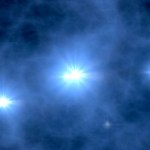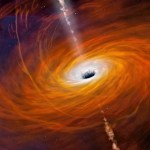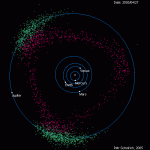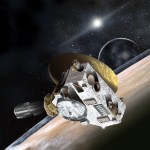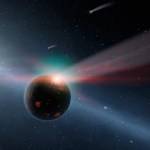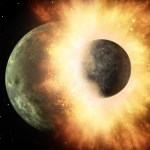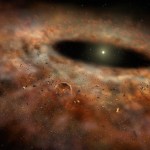gravity
“Movin’ right along.
You take it, you know best.
Hey, I’ve never seen the Sun come up in the West?” -The Muppet Movie
Few things in this world are as regular as sunrise and sunset. With the application of a little physics, you can predict exactly where and when the sun will rise or set from any location on Earth. Thus far, every world in our Solar System -- planet, moon and asteroid -- has had the exact same experience as us.
Image credit: NASA Ames / Dana Berry, of the LADEE spacecraft.
But out in the Kuiper belt, Pluto is different. The only known world in the Solar System where a…
“Oh leave the Wise our measures to collate. One thing at least is certain, light has weight. One thing is certain and the rest debate. Light rays, when near the Sun, do not go straight.” -Arthur Eddington
While we know full well today that Newtonian gravity is just an approximation to a more correct theory of gravity, you've got to remember that for over 200 years, it was unchallenged as the science that explained the entire Universe. When a simple puzzle -- the orbital mechanics of just one of the planets -- failed to line up with its predictions, it was assumed there was a problem…
“[I]f there were no light in the universe and therefore no creatures with eyes, we should never know it was dark. Dark would be without meaning.” -C.S. Lewis
The Universe had two periods where light was abundant, separated by the cosmic dark ages. The first came at the moment of the hot Big Bang, as the Universe was flooded with, among the matter, antimatter and everything else imaginable, a sea of high-energy photons, including a large amount of visible light. As the Universe expanded and cooled, eventually the cosmic microwave background was emitted, leaving behind the barely visible,…
“Journalists often ask me when I go to the field, ‘What do you expect to find?’ And my answer always is, ‘The unexpected,’ because we’re just looking at the tip of the iceberg; we’ve just scratched the surface.” -Donald Johanson
Imagine you wanted to know what your acceleration was anywhere on Earth; imagine that simply saying "9.81 m/s^2" wasn't good enough. What would you need to account for?
Image credit: © 1999–2014 Michael Pidwirny, via http://www.physicalgeography.net/fundamentals/10k.html.
Sure, there are the obvious things: the Earth's rotation and its various altitudes and…
If you're not a theoretical physicist yourself, you might think that physics is physics -- we ask questions about the Universe, do experiments/make observations, and get the answers -- and math is just a tool that we use to help us get there.
Image credit: © 2015 Shaper Helix — II Demo, via http://www.alevelsolutions.com/pure-mathematics.
But that really sells the power of mathematics short. For a physical theory to be valid, there are a whole host of mathematical properties that theory needs to possess, including being free of logical inconsistencies, making predictions about observables…
“We live in a world that has narrowed into a neighborhood before it has broadened into a brotherhood.” -Lyndon B. Johnson
When you think of our own cosmic backyard -- our planets, Sun, the nearby stars, and even the closest galaxies to us -- you probably don't think of them in the context of the entire Universe. But if you want to understand where we come from and how we got to be this way, perhaps you ought to.
Image credit: J. W. Inman, of NGC 2543, via http://www.jwinman.com/starcharts/NGC%202543%20chart.htm.
We could have been a single, isolated galaxy hanging out all by our lonesome…
“Hope is not the conviction that something will turn out well but the certainty that something makes sense, regardless of how it turns out.” -Vaclav Havel
When you take a look at the planets in our Solar System, one of the most striking features about them is that they all orbit in almost exactly the same plane.
Image credit: Joseph Boyle of quora, via http://www.quora.com/How-close-are-the-planets-of-our-solar-system-to-b….
It didn't have to be this way, of course; you could imagine a scenario where the planets swarmed in a great, random sphere around our central star. After all, gravity…
“Nobody ever did, or ever will, escape the consequences of his choices.” -Alfred A. Montapert
You might not think of falling into a black hole as a choice, but in the case of this week's Ask Ethan, someone is choosing to explore exactly that!
Image credit: original unknown, retrieved from http://mondolithic.com/.
Imagine, if you will, taking a solid object that's completely outside of an event horizon, of choosing a very massive black hole with minuscule tidal forces at that location in space, and then just barely pushing a tiny piece of that object over to the other side of…
“On a cosmic scale, our life is insignificant, yet this brief period when we appear in the world is the time in which all meaningful questions arise.” -Paul Ricoeur
What you see is what you get, except when it isn't. We're all familiar with Hubble's law, or the notion that the Universe is expanding, and that the farther away you look, the faster you'll see that distant galaxy moving away from you. This relation would be exact, if only the rest of the objects in the Universe didn't exert gravitational forces on one another.
Image credit: Cosmic Flows Project/University of Hawaii, via http://…
“Try to imagine what it will be like to go to sleep and never wake up… now try to imagine what it was like to wake up having never gone to sleep.” -Alan Watts
Neutron star matter is the stuff of legends: it's the densest three-dimensional material to exist in our Universe. With a density some 10^22 times that of water, you might think that a tiny chunk of it would be incredible to possess.
Image credit: The Mighty Thor / Marvel Comics.
But would such a chunk be stable, or would something catastrophic happen if you took a dense group of neutrons out of a neutron star? And if a small amount…
“The moon was like this awesome, romantic, mysterious thing, hanging up there in the sky where you could never reach it, no matter how much you wanted to. But you’re right. Once you’re actually here, it’s just a big, dull rock.” -Futurama
Oh, but the big dull rocks are fascinating in their own right. Especially, mind you, when there are more of them than we ever expected. Jupiter, for example, has not only all the moons that orbit around it, but a whole slew of gravitationally captured objects -- the Trojans (and Greeks) -- that orbit in front and behind it.
Image credit: Petr…
“Where you used to be, there is a hole in the world, which I find myself constantly walking around in the daytime, and falling in at night.” -Edna St. Vincent Millay
It's the ultimate dream of many children with time on their hands and their first leisurely attempt at digging: to go clear through the Earth to the other side, creating a bottomless pit.
Image credit: original source unknown.
Most of us don't get very far in practice, but in theory, it should be possible to construct one, and consider what would happen to a very clever test subject who took all the proper precautions,…
“Henceforth space by itself, and time by itself, are doomed to fade away into mere shadows, and only a kind of union of the two will preserve an independent reality.” -Hermann Minkowski
When you think of waves, chances are you think of some type of pressure wave moving through a medium, like sound or water waves, or you think of light, which is an electromagnetic wave that requires no medium to move through. But there's another type of wave that exists, that no one expected before Einstein came along: gravitational waves.
Image credit: Wikimedia Commons user MOBle.
It's very…
“Even in hindsight, I would not change one whit of the Voyager experience. Dreams and sweat carried it off. But most of all, its legacy makes us all Earth travelers among the stars.” -Charley Kohlhase
It's a taxing enough task to launch something off the surface of the Earth, escaping our planet's gravity and finding our way into interplanetary space.
Image credit: Delta II rocket launch, public domain, via http://www.gps.gov/.
But to reach the outer Solar System? To go beyond the gas giants and even escape from our Sun's pull completely? We need a little help to do that. Thankfully,…
“From an incandescent mass we have originated, and into a frozen mass we shall turn. Merciless is the law of nature, and rapidly and irresistibly we are drawn to our doom.” -Nikola Tesla
Stability: it's the hallmark of the Solar System. The motions of all the planetary bodies are regular and periodic. The paths of the various objects never cross, and everything that has continued for billions of years should continue, undisturbed, for billions more.
Image credit: Mark Garlick / Science Photo Library.
Unless, of course, something came along to mess that up! In our Solar System, the comets…
“But even when the moon looks like it’s waning…it’s actually never changing shape. Don’t ever forget that.” -Ai Yazawa
You've seen the iconic crescent, quarter, gibbous and full phases for yourself, and probably even an eclipse or two. For millennia, the Moon has fascinated, delighted and mystified observers of the skies. Less than 50 years ago, in fact, we walked on it for the first time.
Image credit: NASA / Apollo 11.
Yet even when we did so, we had no idea where our Moon actually came from! We're the only planet in the entire Solar System with a Moon that's such a large percentage…
“I think if I had to choose, I would rather have gravity instead of zero gravity. It’s fun for a while, but I’d rather live on Earth.” -Kevin A. Ford
By now, you've probably had a lot of opportunities to think about what holds our Universe together: the incredible force of gravitation. Although it's the weakest known force in the Universe, there seems to be no limit to how much mass you can collect in one place. And so on the largest scales -- like solar systems, stars and galaxies -- it seems to be the only force that matters.
Image credit: © 1998–2015 Lynette R. Cook.
Yet the matter that…
Sure, the Big Bang is great. Going back to very early times, it tells us the Universe was in a hot, dense state, where even the possibility of forming neutral atoms was impossible due to the incredible energies of the Universe at that time. The patterns of fluctuations that are left over from that time give us insight into the primordial density fluctuations that our Universe was born with.
Image credit: NASA / WMAP.
But there's an additional signature encoded in this radiation, one that's much more difficult to extract: polarization. While most of the polarization signal that's present…
When it comes to physics, there sure are some strange theories -- and even stranger phenomena -- out there. The notion that particles don't have fixed, intrinsic properties that are simultaneously measurable can only be described as weird, and the fact that you can add as much energy as you want to a particle but it will never accelerate to beyond a particular speed is certainly counterintuitive. Yet one theory has them all beat.
Image credit: John D. Norton, via http://www.pitt.edu/~jdnorton/teaching/HPS_0410/chapters/Special_relati….
For ninety-nine years, now, General…
“I was confided to your loyalty and accepted by your treason; you offer my death to those to whom you had promised my life. Do you know who it is you are destroying here? It is yourself.” -Victor Hugo
So those of you who've been paying attention may have just heard that we've mapped out our supercluster of galaxies -- Laniakea -- to unprecedented accuracy, identifying a region 500 million light-years in diameter that's responsible for our local group's motion through space.
Image credit: R. Brent Tully (U. Hawaii) et al., SDvision, DP, CEA/Saclay, of Laniakea, our local “supercluster” of…


